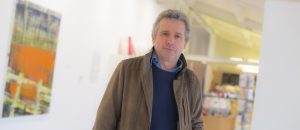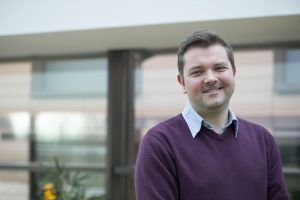
December 21, 2018, by Rob Ounsworth
Chief Scientific Adviser, fellowships and honours for researchers
Professor Tom Rodden has been appointed as Chief Scientific Adviser for the Department for Digital, Culture, Media and Sport.
He is among significant numbers of our outstanding academics recognised throughout 2018 by their peers and learned societies for pioneering contributions to scholarship and delivering world-class research.
Many of these accolades featured in a review of 2018 by Professor Dame Jessica Corner, Pro-Vice-Chancellor for Research and Knowledge Exchange.
Tom Rodden, Professor of Computing, founded and co-directed the Horizon Digital Economy Research Institute, a university-wide interdisciplinary research centre focusing on the use of personal data in the digital economy. He has explored the role of digital technologies across the culture and creative sectors exploiting a range of mobile and novel interactive technologies. He is also a fellow of the Royal Academy of Engineering.
Professor Roden’s research brings together a range of human and technical disciplines, technologies and techniques to tackle the human, social, ethical and technical challenges involved in ubiquitous computing and the increasing use of personal data and he has acted as technical advisor to companies including; the Microsoft Research Lab in Cambridge, Mobile Life (a Swedish centre of excellence) and been a visiting scientist at Xerox PARC and the Swedish Institute of Computer Science (SICS).
He is also the Deputy Executive Chair of the Engineering and Physical Sciences Research Council (EPSRC) where he is responsible for research strategy, acting as the UK Research and Innovation lead in both Artificial Intelligence (AI) and e-Infrastructure.
He said: “I am very pleased to have been selected for this Chief Scientific Adviser role and I am looking forward to working with new colleagues at DCMS and across government to ensure the UK has a vibrant creative economy, benefits from its world-leading cultural assets and stays at the leading edge of the digital revolution.”
Discover more about Professor Roden’s honour.
Professor Paul Crawford elected as a Fellow of the Royal Society for Public Health
Paul Crawford, Professor of Health Humanities, was recognised by the Royal Society for Public Health for his work in pioneering the field of Health Humanities and conducting multiple investigations relevant to public health.
He recently completed a £1.5m Arts and Humanities Research Council-funded programme entitled ‘Creative Practice as Mutual Recovery’, making the findings available in a digital showcase in association with the Mental Health Foundation.
Professor Crawford is currently Co-Investigator on a £1.25m Economic and Social Research Council/UKRI Cross-Council Network Plus programme called ‘MARCH’ which seeks to increase social and cultural assets for mental health, and Principal Investigator for a £840, 000 Arts and Humanities Research Council-funded project on Florence Nightingale who was an early and significant contributor to the development of public health.
He said: “I am delighted to receive this recognition for my work. I take seriously the potential for the arts and humanities to be a kind of ‘shadow health service’ for the public. While it is a personal feather in my cap to be elected, the honour reflects the tremendous energy and enthusiasm for health humanities among colleagues across the University of Nottingham.”
Professor John Atherton, Pro-Vice-Chancellor, Faculty of Medicine and Health Sciences, said: “The Faculty and University are very proud to have this honour bestowed on someone who has contributed so strongly to the public good and to academic excellence within the University.
“Paul is a major national and international leader in building synergy between health and the humanities to the great benefit of both. We congratulate him!”
Dr Andrew Mumford elected a Fellow of Royal Historical Society
Dr Mumford, Associate Professor in Politics and International Relations, said: “I’m delighted. The Royal Historical Society Fellowship is in recognition of my ‘contribution to historical scholarship’. These fellowships are not just for academics in history departments but acknowledge the work of those in other disciplines, including politics and international relations, who use historical research methods to help contextualise contemporary events.
“I do a lot of research on warfare and terrorism. Yet to solely analyse the conflicts around the world today in isolation, ignorant of their historical lineage, would be short-sighted. Historical scholarship into the antecedents of contemporary conflict is essential in order to understand the origins, processes, and possible outcomes of the wars around us today. That is why I am delighted that my work on the modern history of warfare and its political management has been recognised by the Royal Historical Society.”
Dr Mumford is co-director of the Centre for Conflict, Security and Terrorism. His research, which includes the study of hybrid warfare, has influenced Nato and Ministry of Defence policy. His latest book is Counterinsurgency Wars and the Anglo-American Alliance.
The Royal Historical Society was founded in 1868 and is the UK’s leading society working with historians to advance the scholarly study of the past and inform policy debates about the study of history.
No comments yet, fill out a comment to be the first



Leave a Reply